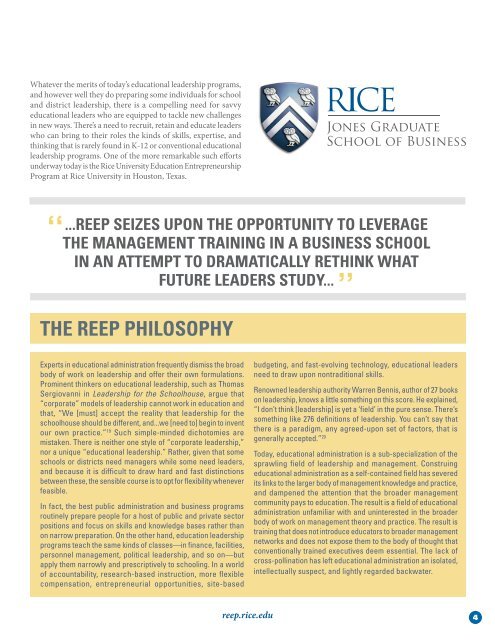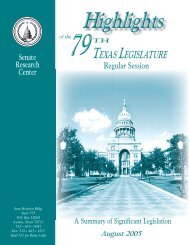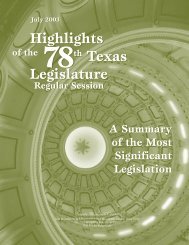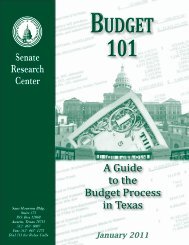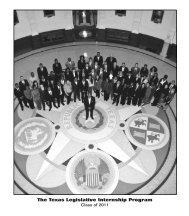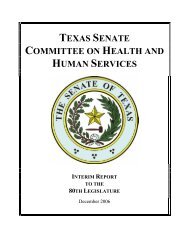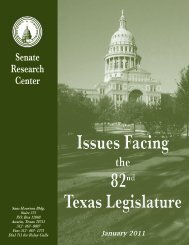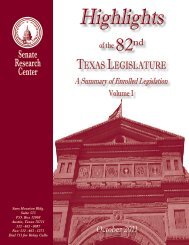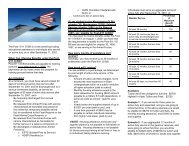Andrea Hodge, Executive Director, Rice Education ... - Senate
Andrea Hodge, Executive Director, Rice Education ... - Senate
Andrea Hodge, Executive Director, Rice Education ... - Senate
Create successful ePaper yourself
Turn your PDF publications into a flip-book with our unique Google optimized e-Paper software.
Whatever the merits of today’s educational leadership programs,<br />
and however well they do preparing some individuals for school<br />
and district leadership, there is a compelling need for savvy<br />
educational leaders who are equipped to tackle new challenges<br />
in new ways. There’s a need to recruit, retain and educate leaders<br />
who can bring to their roles the kinds of skills, expertise, and<br />
thinking that is rarely found in K-12 or conventional educational<br />
leadership programs. One of the more remarkable such efforts<br />
underway today is the <strong>Rice</strong> University <strong>Education</strong> Entrepreneurship<br />
Program at <strong>Rice</strong> University in Houston, Texas.<br />
“ ...REEp sEizEs upon thE oppoRtunity to lEvERagE<br />
thE managEmEnt tRaining in a businEss school<br />
in an attEmpt to dRamatically REthink What<br />
futuRE lEadERs study... ”<br />
The ReeP PhilosoPhy<br />
Experts in educational administration frequently dismiss the broad<br />
body of work on leadership and offer their own formulations.<br />
Prominent thinkers on educational leadership, such as Thomas<br />
Sergiovanni in Leadership for the Schoolhouse, argue that<br />
“corporate” models of leadership cannot work in education and<br />
that, “We [must] accept the reality that leadership for the<br />
schoolhouse should be different, and...we [need to] begin to invent<br />
our own practice.” 19 Such simple-minded dichotomies are<br />
mistaken. There is neither one style of “corporate leadership,”<br />
nor a unique “educational leadership.” Rather, given that some<br />
schools or districts need managers while some need leaders,<br />
and because it is difficult to draw hard and fast distinctions<br />
between these, the sensible course is to opt for flexibility whenever<br />
feasible.<br />
In fact, the best public administration and business programs<br />
routinely prepare people for a host of public and private sector<br />
positions and focus on skills and knowledge bases rather than<br />
on narrow preparation. On the other hand, education leadership<br />
programs teach the same kinds of classes—in finance, facilities,<br />
personnel management, political leadership, and so on—but<br />
apply them narrowly and prescriptively to schooling. In a world<br />
of accountability, research-based instruction, more flexible<br />
compensation, entrepreneurial opportunities, site-based<br />
reep.rice.edu<br />
budgeting, and fast-evolving technology, educational leaders<br />
need to draw upon nontraditional skills.<br />
Renowned leadership authority Warren Bennis, author of 27 books<br />
on leadership, knows a little something on this score. He explained,<br />
“I don’t think [leadership] is yet a ‘field’ in the pure sense. There’s<br />
something like 276 definitions of leadership. You can’t say that<br />
there is a paradigm, any agreed-upon set of factors, that is<br />
generally accepted.” 20<br />
Today, educational administration is a sub-specialization of the<br />
sprawling field of leadership and management. Construing<br />
educational administration as a self-contained field has severed<br />
its links to the larger body of management knowledge and practice,<br />
and dampened the attention that the broader management<br />
community pays to education. The result is a field of educational<br />
administration unfamiliar with and uninterested in the broader<br />
body of work on management theory and practice. The result is<br />
training that does not introduce educators to broader management<br />
networks and does not expose them to the body of thought that<br />
conventionally trained executives deem essential. The lack of<br />
cross-pollination has left educational administration an isolated,<br />
intellectually suspect, and lightly regarded backwater.<br />
4


